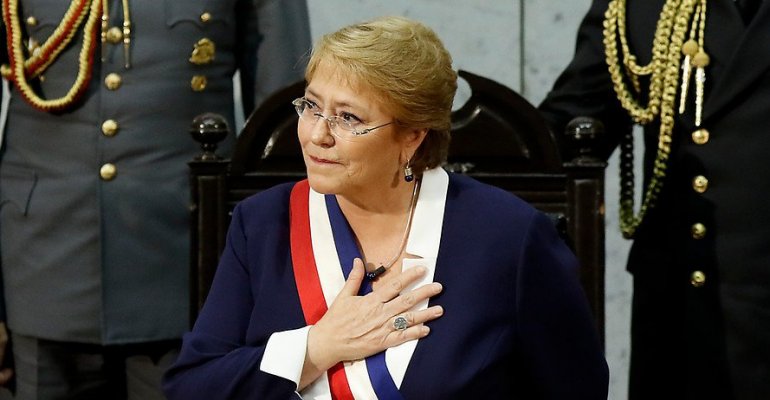Bachelet's state of the nation address 2017

Country Risk Chile analyses Chilean President Ms. Michelle Bachelet’s State of the Nation Address 2017, June 1, in the light of 2nd generation reforms, growth targets and stability. What are the implications of her Reform Agenda in the short- and long-term?
Assessing President Bachelet's State of the Nation Address 2017
Bachelet’s account of the Agenda of reforms, pledged and implemented, are the focus of analysis in the local media by experts and interest groups these days. In an electoral year, analysis can be easily tarnished with an ideological bias. Country Risk Chile will attempt to shed light on the risks and opportunities of Bachelet’s Agenda for Reforms with the lens of international relations and the pressing challenges for middle-income countries like Chile, in transition to full development (WEF country report Chile 2016-2017).
1. Growth Targets: striving towards a value-added economy
President Bachelet's State of the Nation Address 2017, June 1, was, in essence, not only the political call on progressive forces to unite and deepen the path of reforms, but also, the announcement that her reforms have laid out the foundations for more sustainable growth, away from copper-dependence, and with a view to obtaining value-added in the productive chain.
Speech June 1: “Chile cannot live on short-lived economic booms, with a short-sight vision, this is no way for sustainable growth; it weakens social cohesion”
Back in January 2017, President Bachelet had expressed to Bloomberg her strategies and efforts to overcome within a decade, Chile’s "addiction to copper", and her conviction that Chile needed to jump into a more diversified economy. Bachelet also re-assured Chile was committed to maintaining the country's long-standing commercial deals in the global market. Country Risk Chile monitored Bachelet’s Pro-investment, Pro-growth Agenda 2030, on March 31, 2016, and informed on the key steps taken in that direction to deal with the menace of economic slowdown and record-low copper prices.
Earlier on, in July 2015, AmCham Chile had already praised the Government's new investment scheme launched by President Bachelet to counterbalance the effects of a new tax reform. AmCham Chile hailed the plan as in line with OCDE guidelines. (Invest Chile was created in the wake of the gradual repeal of DL 600 and FUT, resulting from the new tax reform to fund education). By March 2016, President Bachelet declared the lithium resources in the north of Chile as strategic, with a view to investment, tied to value-added exploitation, as monitored by Country Risk Chile. During 2016, Invest Chile, the new pro-investment Agency, embarked on promoting Chile and finding partners in renewable energy, solar-powered energy in the north and lithium exploitation intended to reach value-added products as reported in August 2016
Speech June 1: “We have laid out the foundations for a more sustainable growth. In the north of Chile, there is a new pool of development, a solar industry with the lithium exploitation tied to added-value in the productive chain”
By August 2016, the Ministry of Energy under the leadership of Maximo Pacheco announced the historic bid for Renewable Energy, which ensures low utility prices for the coming decades. That way Chile leads in the area of clean energy in Latin America.
2. Stability and Governance: social demands and the fiscal rule
Country Risk Chile followed up the difficult challenges institutions were facing in the light of social demands in the wake of students’ mobilizations of 2006 and 2011 over ruinous loans to pay for university fees and quality of education. Could Bachelet’s 2nd Generation Reforms strike the balance between fiscal prudence and expenditure on social demands? Country Risk Chile estimates that the 2013 electoral cycle, when the State shifted to include bottom-up preferences in policy-making, is a turning point for Chilean institutions in tackling inequality. Top-down policies during the 25-year political cycle of transition (1989 - 2013) reduced poverty dramatically, secured growth targets, embedded the country into the world market through numerous FTAs, but failed to correct growing inequality. The mobilizations and new actors shaping the Government Agenda mark the onset of a post-transition era, and the challenges imposed on Chilean institutions. Against the backdrop of low-record copper prices and the end of the boom of commodities with China's diminished appetite for copper, Country Risk Chile monitored the austerity measures taken by Finance Minister Rodrigo Valdés, in line with the fiscal rule and counter-cyclical norms as reported in Feb 2016.
Speech June 1: “Chile had become a country with tensions and impatience. A country of unfair inequalities, where unhealthy patterns had become a regular practice (….) no country can really move forward with such high levels of inequality, profound changes were needed, with the participation of all actors, with a forward-looking vision”
- Second Generation Reforms
Despite the great success of the Transition governments 1989 - 2013, on growth targets, opportunities were missed to correct the structural heterogeneity resulting from what Ben Ross Schneider calls the hierarchical capitalism that Chile displays, with a heavy dependence on raw material exports, low productivity, and concentrated wealth. The boom of commodities obscured the alarms raised by the different WEF Country Reports, published as early as 2008 and into 2016, where Chile still leads the region in terms of business climate and yet continues to show limited innovation skills in its workforce, namely poor educational variables.
Speech June 1: “We are not talking about scholarships only. We are talking that today in Higher Education, all students from the 50% families of the poorest quintiles of society will be able to study without bank loans in 32 universities and as of this year in 6 technical colleges and 6 apprenticeship schools in Chile”
It must be recognized that failures to narrow the skills gap and the income gaps with more radical reforms during transition times (1990 - 2013), helped paved the way for less competitiveness, due to “a hesitating pro-development agenda, with insufficient tax collection, the inability to implement a productive development, especially in regards to SMEs” (Ffrech-Davies 2016 p 2).
In line with the all-Chileans-on-board focus in policy-making to boost inclusive growth by OECD, President Bachelet’s NM centre-left coalition embarked on a difficult road to narrow the gaps. First, a controversial tax reform to pay for education, a labor reform, an electoral reform and the mechanism to enact a New Constitution. These reforms have been at the heart of a highly ideological debate. On one hand, a more market-friendly sector of the Nueva Mayoría centre-left coalition has displayed preference to gradualist, incremental changes. On the other hand, radical sectors of the coalition press for more state influence. This push-pull tension has increased the ideological divide, making the traditional consensus principle to reach accords in policy-making harder to negotiate. Even though reforms may have exhibited some degree of hastiness or a lack of technical robustness for some analysts, the reality is that such consensus was nonetheless reached, despite being the object of fierce opposition from right-wing or regressive forces consolidated during the boom of commodities.
However, and in the line of growth and fiscal prudence, by December 2016, S&P and Fitch's Ratings changed their outlook of Chile from stable to negative, owing to increasing fiscal debt and record-low copper prices, but did not substantially affect the AA- ratings Chile enjoys for its financial resilience and credibility (S & P). However, Chile has experienced its lowest GDP since the 80s, around 1% and 2%, which is the projected growth for 2017 at the end of the super cycle, and lower copper imports from trading partners such as China.
Detractors of Bachelet’s reforms, explain that the economic slowdown points to excessive reforms affecting investor's confidence. Advocates of Bachelet’s reforms, explain the sluggishness is the result of a limited economic model, which, because is extractive, it lacks in value-added products and is accompanied by a poorly educated workforce, which in turn puts the idea of investing in education into center-stage. COFACE Chile Outlook 2016-2017 highlights Chilean strengths such as rule of law, fiscal austerity, and numerous FTAs, but at the same time points to Chilean heavy dependence on copper for revenues as a weakness in the risk projection.
- Transparency laws:
Speech June 1: “We have seen what happens when we move the heavy veil covering abusive practices and we have stood up against it”
Country Risk Chile followed up the cases of tax fraud and illegal campaign financing (Penta, SQM and Caval) in 2016 and highlighted the separation of powers and an independent Prosecutor as an indicator of the rule of law and credibility of justice. The elite attrition in these iconic cases produced the window of opportunity to upgrade legislation on cases of corruption with exemplary penalties and jail sentences for those in breach of the law as it was reported by Country Risk Chile in 2016.
Some Conclusions:
Moving Chile towards the value-added chain of productivity is the right step towards overcoming copper-dependence and upgrading institutions via investment in education, with synergies between State and private sectors, through labs and clusters. Informing the population that this will take time and investment to consolidate the shift of Chile towards innovative markets is a responsible decision, a forward-looking vision, and with a great political cost when the economy is sluggish, despite the temptations to neglect the fiscal rule. Consensus-oriented policy-making has been a political capital in transition and post-transition times, which has ensured a peaceful shift to democracy during the period of 1990 to 2016 in Chile; this capital must be reinforced and enhanced to all stakeholders to reach accords and protect governance and legitimacy, and consolidate democratic institutions in the light of discontent over inequalities in capitalist societies.
Starting an Agenda of Reforms to tackle inequalities is also a right step towards ensuring stability and decreases the incentives for opportunist populist leaders to rally discontent to get to power. Country Risk Chile estimates that Bachelet's Agenda went in the right direction to help poor students access higher education. Nonetheless, educational variables to boost productivity and prepare the population to jump into innovative markets is a complex task. Equity does not guarantee innovation per se. Equity requires efficiency and quality (Meyer, 2014). By efficiency, we define the rules of the game to which educational bodies will have to strictly adhere through stringent enforcement. Quality is the human factor in the commitment, efforts, and motivation to overcome personal and academic challenges from all stakeholders, students, academics, teachers, and families.
In the Wave to Come, Ian Bremmer, political scientist and expert on global risks, analyses the risk of popular discontent over inequality, which is driving the wave of populism in rich countries; nations like Finland, which have heavily invested in safety nets for example, will encounter less contestation and less instability in the short and long run.
Soledad Soza, June 4, 2017
